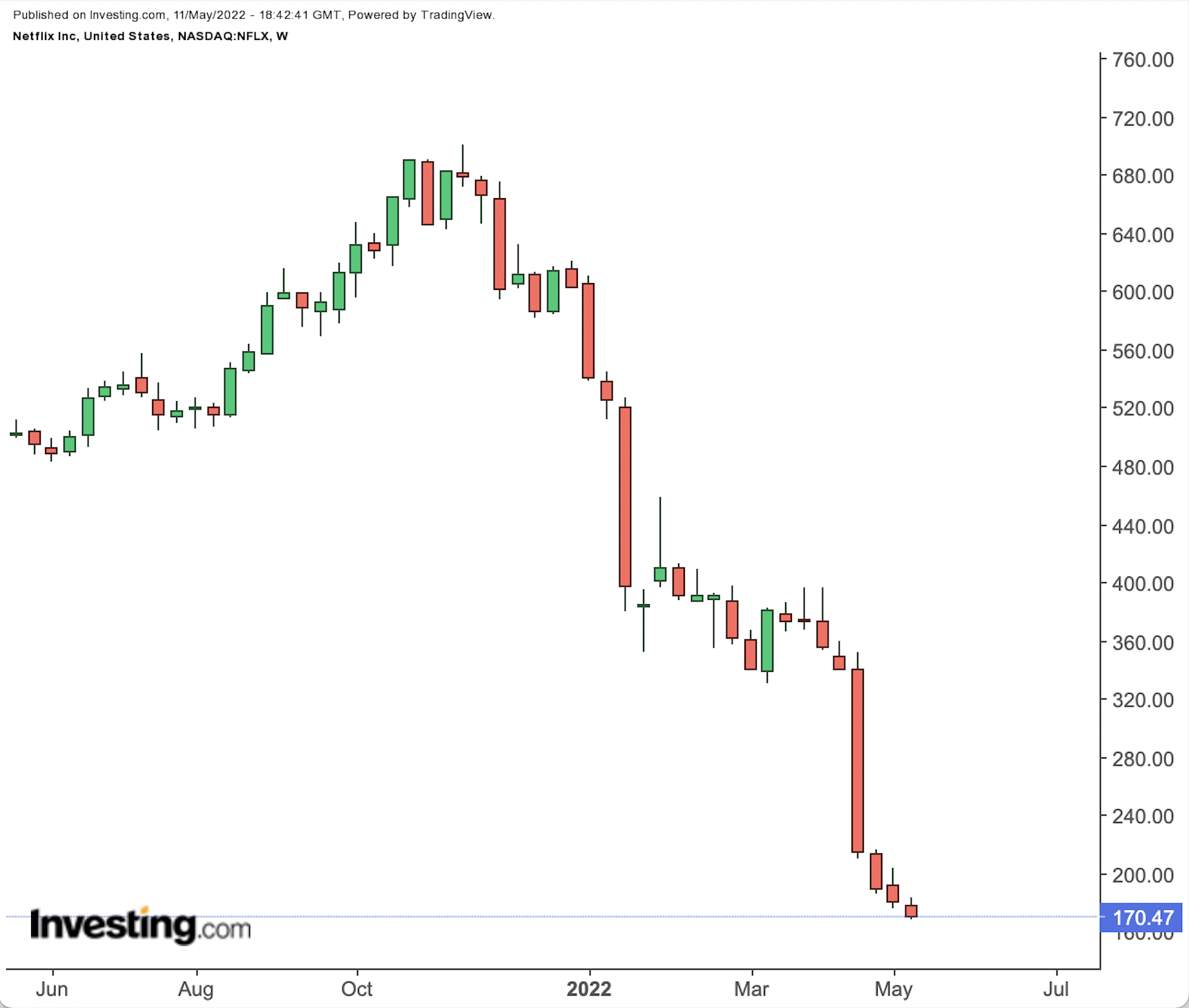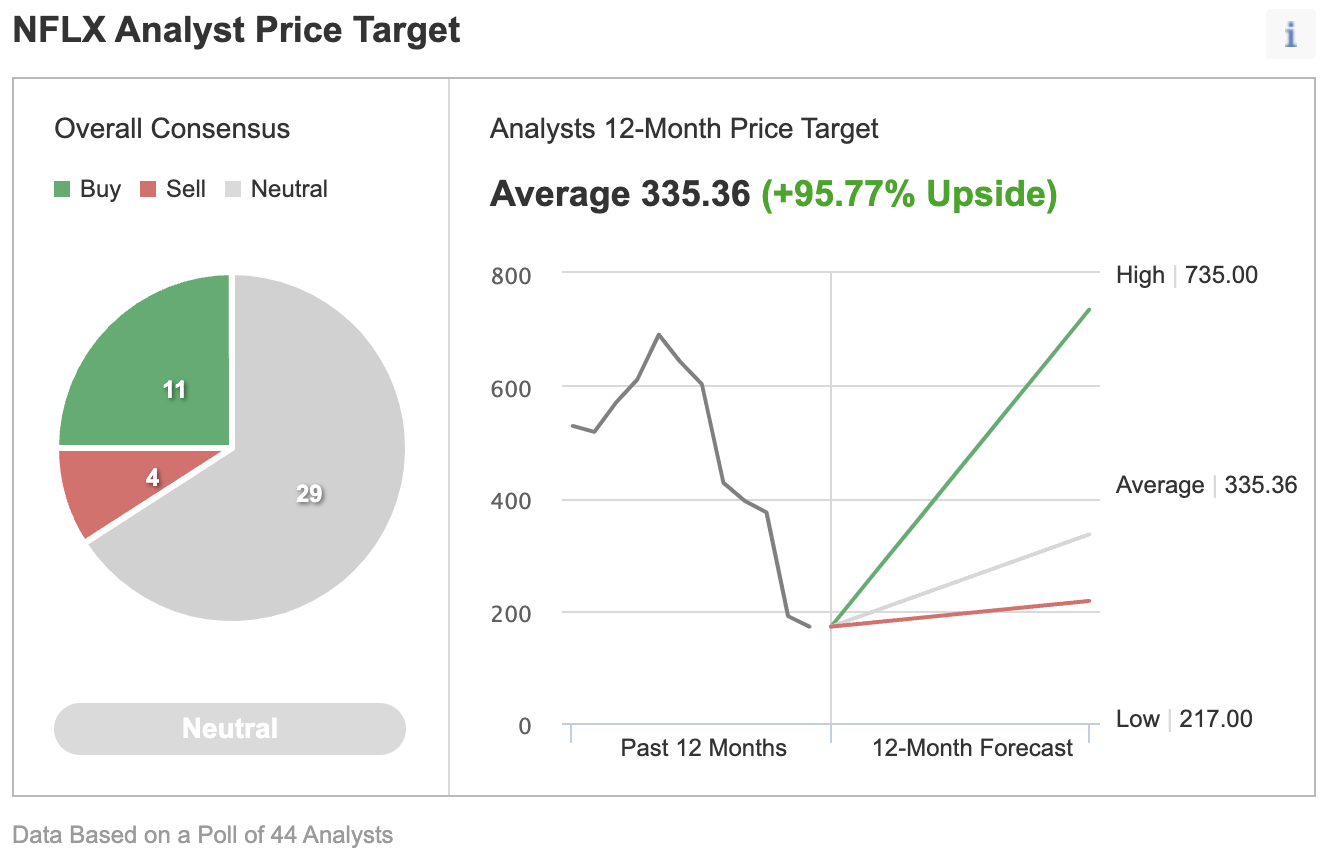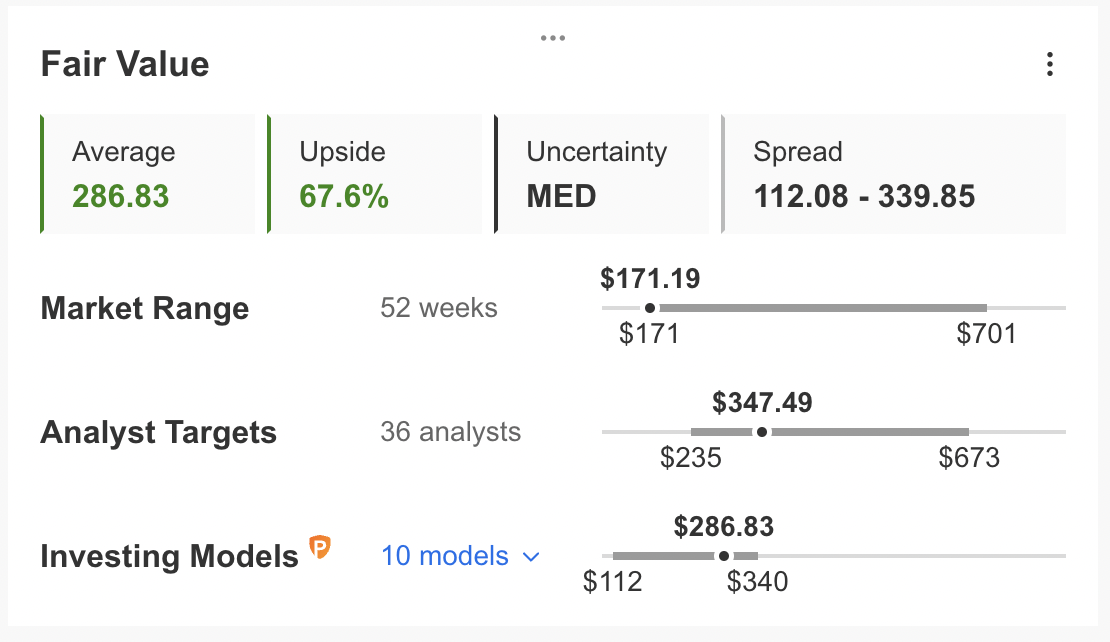- Netflix shares have plunged almost 71% since January
- The sharp decline in subscriber numbers continues to weigh on the company
- Long-term investors could consider buying NFLX stock at current discounted levels
- For tools, data, and content to help you make better investing decisions, try InvestingPro+.
Shareholders of the streaming and entertainment giant Netflix (NASDAQ:NFLX) have seen the value of their investment fall by 63.9% over the past 12 months and close to 71% so far this year. By comparison, the Vanguard Communication Services Index Fund ETF Shares (NYSE:VOX) has lost about 26% so far this year.

On Nov.17, NFLX shares went over $700 to hit a record high. But on May 9, they saw a multi-year low of $172.30, down roughly 75% from its record high value.
Recent metrics suggest the global video streaming market could grow at a compound annual growth rate (CAGR) of more than 21% from 2022 to 2030. Netflix has been the dominant force in streaming video. In the U.S., it boasts a market share of about 20%.
How Recent Metrics Came In
Despite its leadership in the streaming space, Netflix’s revenue growth decelerated as the lockdowns ended. As a result, the communications and media group lost subscribers for the first time in a decade. Management has highlighted rising competition, shared passwords and the suspension of its services in Russia as the key contributors to the downturn.
Netflix released Q1 metrics April 19. Revenue came in at $7.87 billion, up 9.8% year-over-year. The company lost 200,000 subscribers during the quarter, much lower than an earlier guidance of 2.5 million additions. Globally, Netflix has well over 221.6 million subscribers, up 6.7% from Q1 2021. Meanwhile, diluted EPS declined to $3.53, down from $3.75 in the same period last year.
In its letter to shareholders, management stated:
“While we work to reaccelerate our revenue growth - through improvements to our service and more effective monetization of multi-household sharing – we’ll be holding our operating margin at around 20%.”
Netflix expects to lose another 2 million subscribers during the second quarter. While revenue is forecast to hit $8.05 billion, management anticipates diluted EPS of $3 for Q2 period.
Before the release of the first quarter results, NFLX stock was changing hands around $348. At the time of writing, it hovered around $174.80, down roughly 50%. The market capitalization currently stands at $77.9 billion.
What To Expect From Netflix Stock
Among 44 analysts polled via Investing.com, NFLX stock has a "neutral" rating, with an average 12-month price target of $335.36 for the stock. Such a move would suggest an increase of 91% from the current price. The target range stands between $735 and $217.

Source: Investing.com
However, according to a number of valuation models, like those that might consider P/E or P/S multiples or terminal values, the average fair value for NFLX stock on InvestingPro stands at $286.83.

Source: InvestingPro
In other words, fundamental valuation suggests shares could increase by more than 63%.
At present, Netflix stock’s P/E, P/B and P/S ratios are 15.8x, 4.5x and 2.6x, respectively. Comparable metrics for the communication services sector stand at 6.0x, 1.8x and 1.9x, respectively. These numbers suggest NFLX stock does not have a stratospheric valuation anymore.
Our expectation is for NFLX stock to trade in a wide range and build a base between $160 and $200 in the coming weeks. Afterwards, Netflix shares could potentially start a new leg up.
Adding NFLX Stock To Portfolios
Netflix bulls who are not concerned about short-term volatility could consider investing now. Their target price would be $286.83, as indicated by the valuation models.
Alternatively, investors could consider buying an exchange-traded fund (ETF) that has NFLX stock as a holding. Examples include:
- Vanguard Communication Services Index Fund ETF Shares (NYSE:VOX)
- Invesco Dynamic Media ETF (NYSE:PBS)
- First Trust S-Network Streaming & Gaming ETF (NYSE:BNGE)
- Communication Services Select Sector SPDR® Fund (NYSE:XLC)
- Invesco NASDAQ Internet ETF (NASDAQ:PNQI)
Although investors might want to buy NFLX stock for their long-term portfolios, they could also be nervous about further declines in the coming weeks. Therefore, some might prefer to put together a "poor man’s covered call" on the stock instead.
So, today we introduce a diagonal debit spread on Netflix by using LEAPS options, where both the profit potential and the risk are limited.
Investors who are new to the strategy might want to revisit our previous discussion on LEAPS options first before reading further. We have provided a detailed discussion of calculations in those articles.
Most option strategies are not suitable for all retail investors. Therefore, the following example is offered for educational purposes and not as an actual strategy to be followed by the average retail investor.
Diagonal Debit Spread On NFLX Stock
Price at time of writing: $174.80
A trader first buys a longer-term call with a lower strike price. At the same time, the trader sells a shorter-term call with a higher strike price, creating a long diagonal spread.
Thus, the call options for the underlying stock have different strikes and different expiration dates. The trader goes long one option and shorts the other to make a diagonal spread.
Most traders entering such a strategy would be mildly bullish on the underlying security. Instead of buying 100 shares of NFLX, the trader would purchase a deep in the money LEAPS call option, where that LEAPS call acts as a “surrogate” for owning the stock.
For the first leg of this strategy, the trader might buy a deep in the money (ITM) LEAPS call, like the NFLX Jan. 19, 2024, 140-strike call option. This option is currently offered at $68.80. It would cost the trader $6,880 to own this call option, which expires in January 2024, instead of $17,480 to buy the 100 shares outright.
The delta of this option is close to 80. Delta shows the amount an option’s price is expected to move based on a $1 change in the underlying security.
If NFLX stock goes up $1 to $175.80, the current option price of $68.80 would be expected to increase by approximately 80 cents, based on a delta of 80. However, the actual change might be slightly more or less depending on several other factors that are beyond the scope of this article.
For the second leg of this strategy, the trader sells a slightly out of the money (OTM) short-term call, like the NFLX June 17 180-strike call option. This option’s current premium is $11.60. The option seller would receive $1,160, excluding trading commissions.
There are two expiration dates in the strategy, making it quite difficult to give an exact formula for a break-even point. Different brokers might offer “profit-and-loss calculators” for such a trade setup.
Maximum Profit Potential
The maximum potential is realized if the stock price is equal to the strike price of the short call on its expiration date. So the trader wants the NFLX stock price to remain as close to the strike price of the short option (i.e., $180) as possible at expiration on June 17 without going above it.
Here, the maximum return, in theory, would be about $1,470 at a price of $180 at expiry, excluding trading commissions and costs. (We arrived at this value using an options profit-and-loss calculator). Without the use of such a calculator, we could also arrive at an approximate dollar value.
Understandably, if the strike price of our long option had been different (i.e., not $140), its delta would have been different, too. Then, we would need to use that delta value to arrive at the approximate final profit or loss value.
Here, by not investing $17,480 initially in 100 shares of Netflix, the trader’s potential return is leveraged.
Ideally, the trader hopes the short NFLX call will expire out of the money, or worthless. Then, the trader can sell one call after the other, until the long NFLX LEAPS call expires in close to two years.
Interested in finding your next great idea? InvestingPro+ gives you the chance to screen through 135K+ stocks to find the fastest growing or most undervalued stocks in the world, with professional data, tools, and insights. Learn More »
